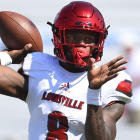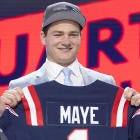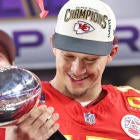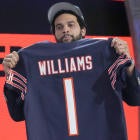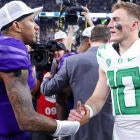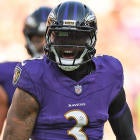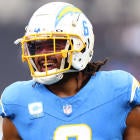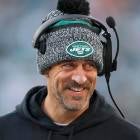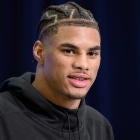Louisville quarterback Lamar Jackson has made a controversial decision in going without an agent to start his NFL career. His mother, Felicia Jones, is serving as his manager. Since Jackson doesn't have an agent, he will be negotiating his own contract. A lawyer he hires or the NFLPA will review the contract's language before he signs it.
During his media session at the NFL combine last month, Jackson cited the rookie wage scale as the main reason for not hiring an agent. Contract values and signing bonuses are predetermined for rookie deals under the current NFL collective bargaining agreement, which was implemented in 2011. The two primary negotiating issues, particularly at the top of the draft, are the payment schedule of the signing bonus and determining whether any salary guarantees will have offsets.
The maximum fee that an agent can charge under the NFLPA's agent regulations is three percent of a negotiated contract. The default fee in the required Standard Representation Agreement that both agents and players must sign was lowered to one-and-a-half percent last year. In some instances, rookies sign with an agent for less than the default fee or pay only a flat fee for their first NFL contract.
Jackson isn't the first player since the 2011 CBA drastically changed how rookies are compensated to represent himself. Safety Matt Elam, who was taken by the Ravens with the last pick in the first round of the 2013 NFL Draft didn't have an agent. A lack of representation didn't prevent left tackle Ereck Flowers from being 2014's ninth overall pick by the Giants. More recently, quarterback Jacoby Brissett hadn't hired an agent when the Patriots made him a third-round pick in 2016. Oklahoma quarterback Baker Mayfield contemplated going the same route as Jackson before ultimately choosing an agent.
How Jackson has fared in the pre-draft process
Jackson's pre-draft process hasn't been smooth sailing. Six-time NFL Executive of the Year and current ESPN analyst Bill Polian, who was enshrined into the Pro Football Hall of Fame in 2015, didn't do Jackson any favors by suggesting that the 2016 Heisman Trophy winner should be an NFL wide receiver because of his athleticism and playmaking ability. Jackson refused to run a 40 yard dash at the combine or on his pro day. NFL teams have reportedly had trouble scheduling meetings and workouts with him.
Curiously, Jackson recently had a private workout with the Texans, who traded up in last year's draft to select quarterback Deshaun Watson with the 12th overall pick. The Texans don't have a pick until the third round.
Jackson reportedly had trouble in combine meetings with teams breaking down X's and O's on the white board. His leaked score on the Wonderlic test -- a 12-minute, 50-question exam administered at the combine that NFL teams rightly or wrongly use to project cognitive ability -- was reportedly 13, subpar particularly for a quarterback. Some teams may view the score as a warning sign where it reinforces a perception created from his board work.
Jackson is widely considered as the fifth-best quarterback available in the draft. The last time five quarterbacks were taken in the first round was 1999, when the first three players selected were quarterbacks and all five were off the board after 12 picks. Most mock drafts, which can be taken with a grain of salt, have Jackson going somewhere in the second half of the first round.
How agents help their clients before the draft
An agent will use his/her contacts with NFL scouts and front-office executives at the start of the pre-draft process to identify a client's strengths and weaknesses. A strategy or game plan will be formulated to combat the existing perceptions about the weaknesses.
I worked with two top-10 picks -- outside linebacker/defensive end Willie McGinest and linebacker Chris Claiborne -- while I was in the agent business. Teams had questions at the beginning of McGinest's pre-draft process about whether he was strictly a defensive end or could also play outside linebacker effectively in a 3-4 scheme. Since he rarely dropped in coverage during his four years at USC, NFL teams initially were concerned about this ability.
Eliminating this concern factored into our early decisions. An invitation to play in the East-West Shrine Game was accepted over the Senior Bowl because former long-time Cowboys personnel executive Gil Brandt, who was charge of player selections, assured us that McGinest would get ample opportunity during practice and the game at linebacker so he could showcase his ability to drop in his coverage. At the time, which hasn't been the case in many years, the two games were viewed as comparable by the NFL community.
We had McGinest work extensively with one of our veteran NFL linebacker clients who excelled in coverage prior to the Shrine Game practices. We also had a few NFL teams that we had good relationships with request to the combine that McGinest perform position drills for linebackers, for which he had been preparing. McGinest did position drills at both linebacker and defensive end. I like to think that the decisions we helped McGinest make played some role in him going fourth overall to the Patriots in 1994.
The pre-draft process has changed over the years. Training at a facility that prepares players for the combine and pro day workouts is provided to players at the agent's expense. Multiple agents utilize former Raiders and Falcons executive Ken Herock, whose NFL front-office experience dates back to the 1970s, to get clients ready for meetings with teams at the combine and for the Wonderlic test. The white-board sessions in these meetings are more critical for quarterbacks than other positions.
A dedicated quarterbacks coach is typically employed to help correct any flaws with mechanics, footwork and throwing motion. The quarterbacks coach, who is usually an offensive-minded former NFL coach (head coach, offensive coordinator, quarterbacks coach) or former NFL passer, will also script the pro day workout.
How an agent would specifically help Jackson
An agent would be trying to position Jackson to NFL teams as a comparable or better prospect than Wyoming's Josh Allen, USC's Sam Darnold, UCLA's Josh Rosen and Mayfield, who are considered ahead of him. One way this might be done is by analytical or statistical comparisons of Jackson with the other four quarterbacks that paint Jackson in a favorable light. Comparisons to other highly-drafted quarterbacks in recent years emphasizing similar traits Jackson has could also be made. By no means do teams make draft decisions because of an agent, but discussions with a general manager or another front office executive can occasionally help reshape the perceptions of a player.
An agent will also coordinate all pre-draft visits and private workouts. Teams can invite up to 30 players for visits at their facility. Workouts aren't allowed. Some of these visits can be smokescreens but they usually indicate more legitimate interest by a team. These visits should be treated as job interviews by players. An agent might create a detailed summary of the front office, coaching staff, relevant playing schemes and personnel for each team visit. My experience as an agent was that numerous draft-eligible prospects didn't closely follow the NFL and weren't any more familiar with the teams than causal fans.
With a quarterback, it may make sense for the agent or the dedicated quarterback coach to review with the player video of every snap while he was a starter in college so he can better articulate his decision-making process on the plays in case they are a subject on visits. The white board can also play a critical role in visits with quarterbacks.
Private workouts take place at the player's college campus or near his hometown. An agent will make strategic decisions about whether the player should work out when requested by teams. For example, it probably wouldn't make a lot of sense for Jackson to work out for the Eagles since 2016 second-overall pick Carson Wentz, a leading candidate for MVP in 2017 before a season-ending knee injury, is their franchise quarterback.
An agent will also utilize the media in attempt to create a specific narrative around his/her client, both nationally and also in the areas where teams seem mostly likely to select a quarterback. NFL teams aren't going to succumb to media pressure when drafting players, but the exposure could help increase marketability from an endorsement standpoint.
Final thoughts
Quarterbacks have a tendency to get overdrafted so it may be practically impossible to tell whether going through the pre-draft process without an agent negatively impacted Jackson's draft position. If Jackson is taken in the first 15 picks, the conclusion drawn may be that agents aren't indispensable to the process and other high-profile players may follow his lead in the future. Should Jackson go in the second round or Oklahoma State's Mason Rudolph or some other quarterback go ahead of him, he'll likely become the cautionary tale for why paying an agent so he/she can help in navigating the pre-draft process is a good move.












